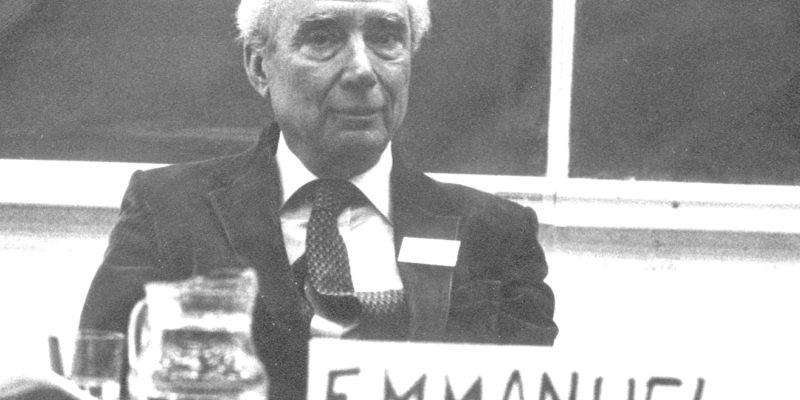Tribute to Arghiri Emmanuel

Arghiri Emmanuel, born in Greece in 1911, died in Paris, at the age of 90, on December 14, 2001. After economic and commercial studies in his native country, he left in 1937 for the former Belgian Congo where he worked in the private sector. In 1942, he joined the Free Greek Forces of the Middle East as a war volunteer and then participated in the uprising of these Forces in April 1944 against the Greek government in exile in Cairo. He was arrested and sentenced to death. Amnestied in 1945, he returned to the Congo where he resumed his activities until his departure for France in 1957. After studying art history at the École du Louvre from 1957 to 1960, he enrolled at the Ecole Pratique des Hautes Études in 1961, where he obtained a doctorate under the direction of Charles Bettelheim in 1968. His academic career began in 1969 at the Department of Economics of the University of Paris VII, and then, from 1972, at IEDES as director of the “International Economic Relations” option until 1980, when he retired. The University of Paris I granted him the title of Associate Professor.
I met Emmanuel in 1974, when I became his assistant. Like most of his students in the 1970s, I had left Latin America after the successive coups d’état that swept most of our countries into the tragic night of repression, assassinations, and disappearances. The meeting with this iconoclast, a nonconformist, was not always easy. The author of L’échange inégal (1969), the subject of his thesis that would make him world famous, clashed with our certainties, our revolutionary convictions. If we, refugees from the Third World, could share his denunciation, we would have been able to do so. The idea that the workers of the rich countries benefited from the transfer of surplus value from the workers of the poor countries that trade with these countries implied was unacceptable to them. But we did not agree with Emmanuel’s demystification of investment imperialism and his bias in favor of multinational corporations as a vehicle for development: for us, who felt victimized by the CIA and NR, his position was difficult to accept.
Discussions with Arghiri easily took on a polemical tone, while the decibels climbed. We soon realized that this was a result of the passion with which he defended his point of view, which also showed the importance he attached to his interlocutors. But, beyond the form, he was unbeatable on the substance. He excelled in logical reasoning, possessed a relentless dialectic, and had an extremely broad knowledge of political economy, especially Marxism, and economic history. Moreover, he had an immoderate taste for paradox. His theses, whether on Unequal Exchange, on the inequality between product and income in Profit and Crises (1974), or to refute Lenin on imperialism in White Settler Colonialism and the Myth of Investment Imperialism (1985), were abundantly demonstrated, and he often responded in advance to all the counter-arguments they might raise. Thus, in addition to rigor, he taught us to abandon our prejudices, to develop our critical sense, and to be wary of received ideas, however dominant they may be.
A. Emmanuel was a member of the editorial board of the Revue Tiers Monde, where he published many articles. How can we not mention here “Le prix rémunérateur, epilogue to l’échange inégal”, in n°81 (1980)? If his thesis could until then appear too theoretical and the revaluation of the prices of Third World exports as a pious hope, the rise in the price of oil in the early 1970s, following the autonomous increase in the remuneration of a national factor, showed the feasibility of such a measure. Restricting supply would raise the price and greatly increase export earnings. For him, what was true for oil was also true for all raw materials exported by the Third World, the price elasticity of their demand being less than one.
Arghiri was not only a brilliant intellectual, but also a committed man. The commitments of his youth first led him to put his life in danger, then he took a stand against colonialism in Africa. He identified with the peoples of the Third World and systematically opposed the arrogance of the great powers towards poor countries. His camp was always that of the weak. An agnostic, he admired Mother Teresa and Sister Emmanuelle and contributed to their work. As an activist for the Third World, he admitted no exceptions. A few days before his death, during our last conversation about the events that had shaken the world at the end of 2001, he said to me to end the discussion: “You understand, even if the Americans are right, I am against them.”
This is how A. Emmanuel was: straight as an oak, without concession, faithful to his thinking and his thirst for justice.
This article was written by Claudio Jedlicki and originally published in French in Revue Tiers Monde, XLII, nr. 168, October-December 2001.
